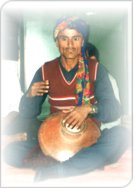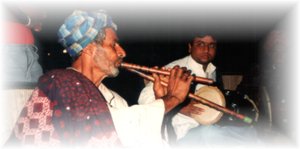|
Ghado or Ghaghar:
Ghado is baked stone jar of an average size. A special variety known as Ghaghar, which is made to order, is a bigger jar full at its sides and having a shorter neck. The soil for Ghado or Ghaghar to be used as a musical instrument, is specially prepared by the expert potter, and is pressed to delicate thickness all over.

Ghado or Ghaghar is a harmonious instrument. The variety of Tals is manipulated on the side walls and other on the mouth of the jar. Occasionally, Ghado or Ghaghar is played to the complement of Surando.
Jodia Pawa:
Jodia Pawa has a important roll in the rich educational custom of Kutch. As we listen to Jodia Pawa, it is natural to understand that Jodia Pawa is a kind of a Bansari-a flute. But in fact it is different from Bansari.
Jodia Pawa is a pair of two flutes or double flutes of the same size and length remains about 20 to 22 inches generally played together keeping both the flute in the mouth. One is called Nar-the male and the other is called Madi or Mali – the female. Nar has eight equi-distant holes for maintaining a whine or Sur. The Madi weaves the tune on this base over twelve holes on top on which fingers move of the twelve holes of the Madi, only the upper six are used functionally to operate music while the lower six are left open and free.
Jodia Pawa – double flutes is also known as Alghoza or Alguja commonly. The Jodia Pawa – a blowing instrument (aerophone) mostly played by the shepherds of the desert area to pass their freedom time when cattle are busy in grazing grass. Sometimes, the Jodia Pawa is used as auxiliary for folk dances, folk lore. It is simple basic bamboo hollow team. A steady voice is produced from the upper holes and this is achieved by the player's storing the necessary air in his mouth and blowing continuously through the mouth piece. The player inhales through the nostrils to provide air in the mouth. The tone of the Jodia Pawa remains on very high pitch and sweet too. In fact, it is a whistle-blown double erect flute made of two cylindrical wooden or bamboo hollow pipes. While playing the Jodia Pawa both the flutes are held perpendicularly and jointly by the same person and the two flutes are blown at the same time. Jodia Pawa requires much strength of lungs. It is difficult to play. One of the master artists of Jodia Pawa is Shri Musa Gulam Jat in Kutch. Shri Musa Jat achieved high status in Great Britain and Germany participating in the festival of India for playing his instrument – Jodia Pawa.

Musa Jat is an approved artist of All India Radio. Bhuj and his performance broadcast over radio irregularly. His Jodia Pawa presentation gives us mental peace while listening to him. To get the harmonious notes from the Jodia Pawa, polish is fixed on various holes methodically.
There are some artists of Jodia Pawa in Kutch at this time. Among them Shri Musa Jat is greater to all. All the Jodia Pawa artists are oppressed people and they work hard for source of revenue.
Jodia Pawa is not made in Kutch. It requires special skill to prepare Jodia Pawa. It is prepared from Shisam, Rose wood, Tali, Sopari, Kel etc. It is prepared on lathe. To protect them from fracture a copper wire is wrapped on some parts of them. Oil is used to get better voice from them. In Sind of Pakistan, Jodia Pawa is prepared, so anybody who wants those, he has to bring them from Sind which cost minimum Rs.500/- a pair. The artists of Jodia Pawa play the beautiful notes of Sufi Saint Abdul Latif Bhitai of Sind. Jodia Pawa is one of the famous instruments of Sind, Rajasthan, and Punjab. The shepherds migrated from north to south to graze their cattle and settled down in some parts of Kutch and they brought Jodia Pawa with them. In this way, the art of playing Jodia Pawa developed in Kutch.
Kani:
Kani or Narr (per.Nai) has been the common traditional instrument of Kutch and Sind, Baluchistan of Pakistan, and of Iran and Turkey.
In Sindhi, Narr is the standard name for all kinds of reed plants, the stalks of which are hollowed or can be hollowed by removing the tissue from inside. The Narr instrument is made from what is known as “Sacho Narr” (the real reed) ore kangore which grows where water is lastingly available. The valley of the Kech River in the Makran District (of Baluchistan) produces one of the best varieties of the reed which has supplied the instrument for the regions of Pakistan and also to Iran and Turkey.
|